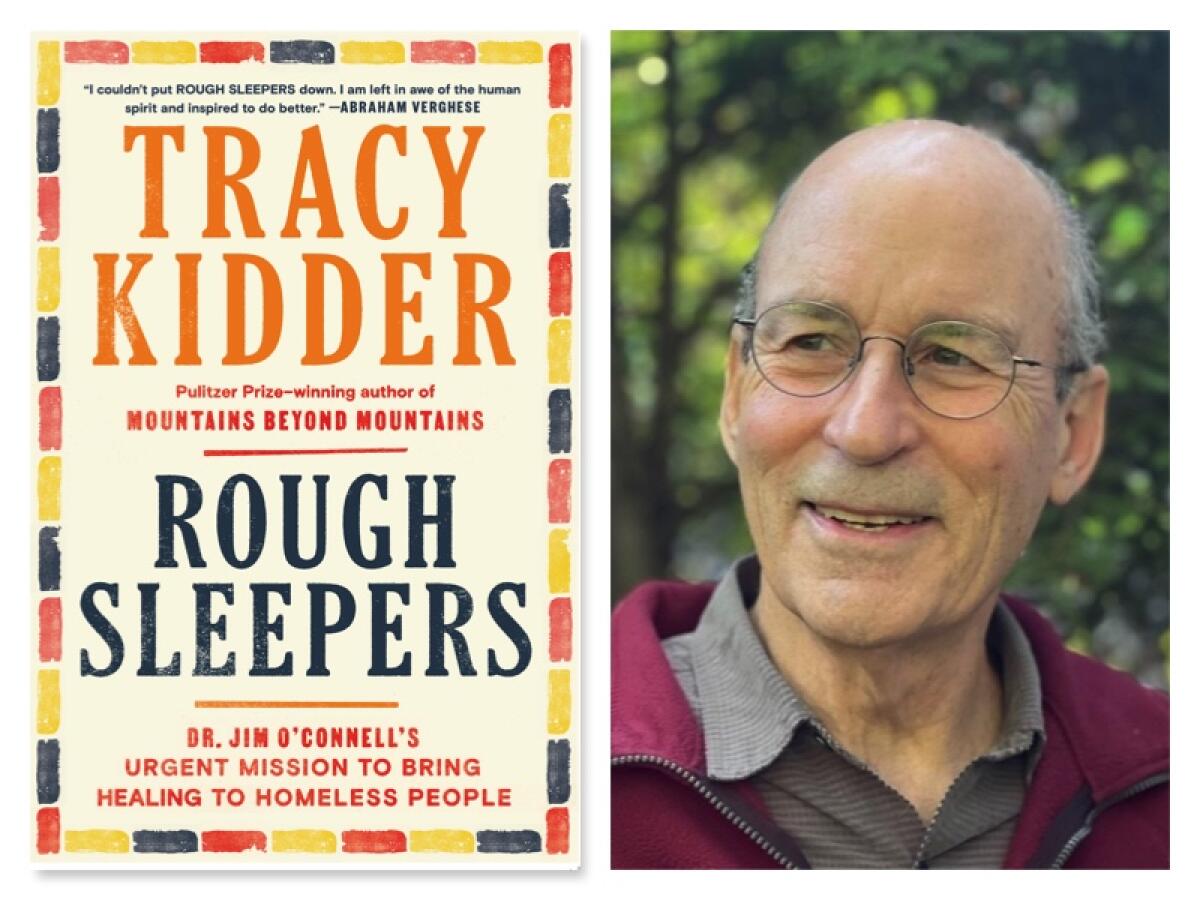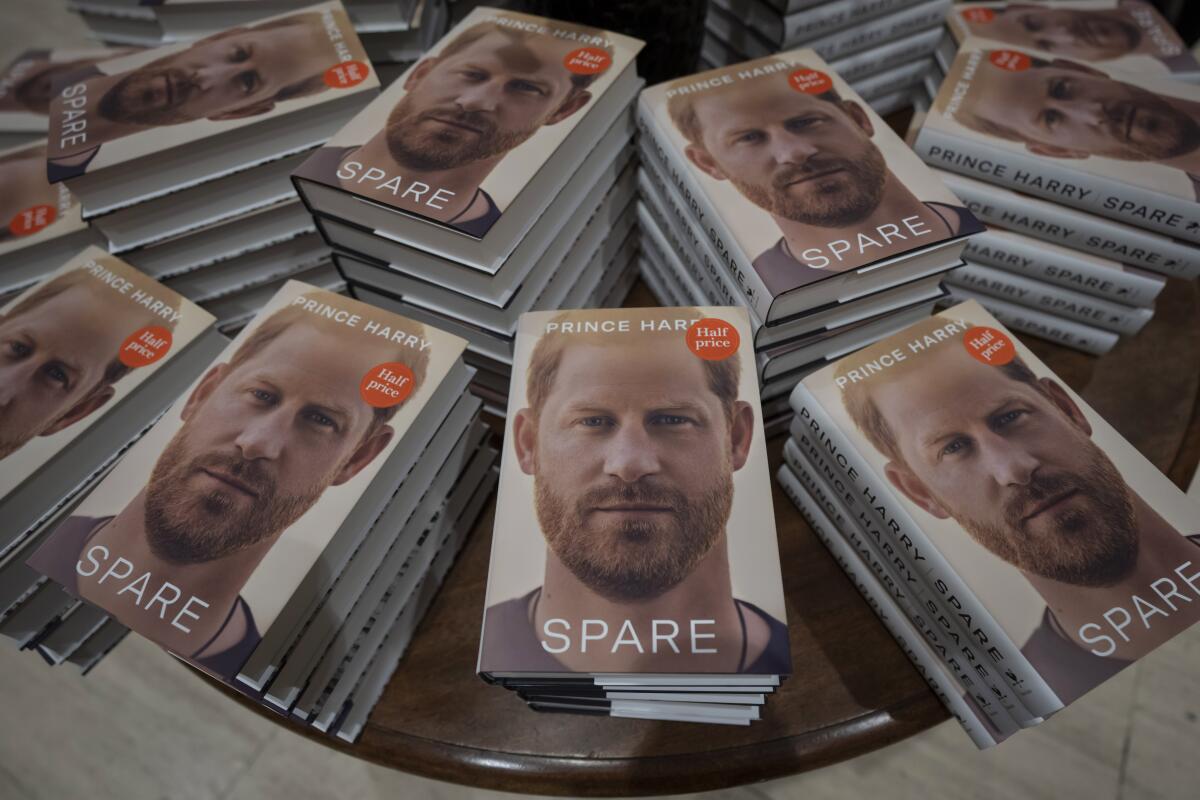Book Club: ‘Rough Sleepers’ chronicles a doctor’s selfless mission

Kidder brings “Rough Sleepers” to the L.A. Times Book Club on Jan. 26.
Good morning, and welcome to the L.A. Times Book Club newsletter.
The doctor hero of Tracy Kidder’s “Rough Sleepers,” Jim O’Connell, tended bar after college before applying for medical school at age 30. And he kept that job to pay the bills while attending Harvard — though it was the bar, not the classroom, where he learned some of his best lessons about being a physician.
There he learned patience. And he learned to listen. They turned out to be priceless skills for O’Connell’s unexpected career path as he created one of the nation’s most coordinated and comprehensive healthcare systems for the unhoused.
For three decades “Dr. Jim,” as he is known on the streets, has been making house calls to the chronically homeless people who huddle in the darkness under tents and tarps in doorways and alleys and on stoops and park benches.
“The night’s tour was a glimpse of a world hidden in plain sight,” Kidder says about his first Boston ride-along in O’Connell’s van. “I was left with a memory of vivid faces and voices, and with a general impression of harsh survival, leavened by affection between a doctor and his patients. Afterward I wondered if I’d misunderstood or misremembered what I’d seen.”
The Pulitzer Prize-winning author returned to join O’Connell and his street team on and off for five years, chronicling the experiences and faces behind the nation’s growing homeless crisis. On Jan. 26, Kidder joins the Los Angeles Times Book Club to discuss “Rough Sleepers” with Times columnist Steve Lopez.
Kidder is perhaps best known for “Mountains Beyond Mountains,” his 2003 book about Paul Farmer, the renowned infectious disease specialist who spent his life on a selfless mission to bring modern medicine to the world’s poorest countries starting with Haiti.
At times, Kidder tells columnist Erika D. Smith, he felt as if he were back in Haiti while riding with O’Connell.
The discarded and forgotten rough sleepers Dr. Jim tended in Boston — not unlike the discarded and forgotten rough sleepers of Los Angeles — were plagued by ailments that shouldn’t exist in a country with as much money and modern medicine as the United States.
“He presents some of the same problems to a writer that Paul Farmer did for me, which was what my beloved editor once called ‘the problem of goodness,’” Kidder says. “How do you persuade a cynical age that people like this actually exist?”
Join Kidder and Lopez for this virtual book club night at 6 p.m. Pacific on Jan. 26. Sign up on Eventbrite. Share your questions for them in advance in an email to bookclub@latimes.com.
Q&A
A master of narrative nonfiction, Kidder has won the Pulitzer Prize, the National Book Award and the Robert F. Kennedy Award for his deep dives inside medicine, education, technology and other worlds. His previous books include “Strength in What Remains,” “Home Town,” “Old Friends,” “Among Schoolchildren,” “House” and “The Soul of a New Machine.”
In advance of January book club night, Kidder shared some of his favorite reads and other diversions:
Last book that kept you up at night: It might have been [Ernest] Shackleton’s “South” or U.S. Grant’s memoir (Edmund Wilson wrote that the book kept one on the edge of one’s seat wondering how the Civil War would turn out). Or it could have been a novel by John le Carré, any one of several.
The writers that most influenced you: George Orwell, John McPhee, Ernest Hemingway, James Baldwin, Stuart Dybek.
Favorite book as a child: “The Wind in the Willows,” maybe because my mother read it to me.
Book you’re most proud of writing: “Mountains Beyond Mountains” or maybe “Rough Sleepers.”
Favorite place to escape: My house in western Massachusetts.
Favorite music right now: I like a lot of different things, classical music and opera, some country music and most of the music from the 1960s and 1970s. But I can’t name a favorite.
Must-watch TV: BBC News
Craziest thing you’ve done to get a story: Maybe trekking with Paul Farmer on a journey through Haiti’s mountains to see a patient. But that only seemed crazy later, when I imagined that I was going to die of thirst — a crazy thought, given that I was with Paul Farmer, who would never have allowed such a thing. I’m not sure this qualifies as crazy, but many years ago, in the late 1970s, I wandered into an industrial basement where a new “minicomputer” was being designed and built. Maybe it was crazy, because for the longest time I couldn’t have explained to anyone what a computer was.
Something that might surprise readers about you: I don’t know. I used to have a lot of energy and a bad temper. Both have faded, I think.
What kept you motivated during the pandemic: I was in the midst of writing “Rough Sleepers,” which kept me busy most of most days. Afterward my wife and I took long walks in the lovely woods of western Massachusetts. Helping her cook, or more accurate, hindering her.
Prince Harry tells all
“Paps were like ants. There were never just one.” On Tuesday Prince Harry, the Duke of Sussex, released his much-awaited “Spare” to tell the story of his childhood, his family and a royal life hounded by the paparazzi and British tabloids. “Those who actually read the book (ghost-written by Pulitzer Prize-winning J.R. Moehringer, who once wrote for The Times) will find more sorrow and personal struggle than sensationalism,” says columnist Mary McNamara.
Todger, Tiggy, Biro and Spike. Here’s a glossary of Harry’s Britishisms for “Spare” readers.
Be prepared for library waits. This week “Spare” has broken sales records (“The only books that have sold faster in a day have been about the other Harry, Harry Potter”) and kept librarians across California struggling to meet demand for the 400-page royal family drama. The wait for digital copies at L.A. County’s library system is around six months. “The public interest in his story has been built in from the time of his birth, and then you factor in the events of his life (the loss of his mother, his military service, his high-profile marriage etc.) — it was just a matter of how fervent that demand would be,” says Wendy Crutcher, the system’s head of collections. “And all that press ... doesn’t seem to have given the public Prince Harry fatigue — people still want to read the book.”
What else is L.A. reading? The two adult books most checked out in 2022 were “The Lincoln Highway” by Amor Towles and “The Dark Hours” by Michael Connelly. With children, Dog Man and Wimpy Kids ruled at the Los Angeles Public Library.
New releases. Also out this week are “Everybody Knows” by Jordan Harper (“next great L.A. noir. Just don’t call it a #MeToo story”) and “The Half Known Life: In Search of Paradise” by travel author and previous book club guest Pico Iyer, a retrospective look at his travels, readings and encounters.

What’s next
Author Brendan Slocumb joins book club readers Feb. 23 to discuss his bestselling mystery, “The Violin Conspiracy,” with Times classical music critic Mark Swed.
Slocumb’s debut novel takes readers into the rarefied world of Ray McMillian, a Black classical musician whose priceless family Stradivarius is stolen on the eve of the world’s most prestigious classical music competition. The story “takes flight on Slocumb’s soaring prose,” says reviewer Paula L. Woods in The Times.
“Even for readers unfamiliar with the music so vividly described, the outcome of the contest, the fate of Ray’s violin and the conspiracy behind its theft will provide more than enough top-shelf entertainment,” Woods writes.
Born in Yuba City, Calif., Slocumb graduated from the University of North Carolina at Greensboro with a degree in music education. For more than 20 years he has been a public and private school music educator and has performed with orchestras throughout Northern Virginia, Maryland and Washington, D.C. “The Violin Conspiracy” was released in paperback in December. Slocumb will publish his second novel, “Symphony of Secrets,” in April.
This free virtual event will livestream at 6 p.m. Feb. 23. Sign up in advance on Eventbrite.
In the meantime, enjoy this classical music playlist inspired by “The Violin Conspiracy.”
Last word
“You can sense, I’m sure, my sympathies and my antipathies,” said novelist Russell Banks, who died last week at 82. “It’s conventional sympathy for the underdog. Hell, what writer worth his or her salt doesn’t have sympathy for the underdog?”
Sign up for our Book Club newsletter
Get the latest news, events and more from the Los Angeles Times Book Club, and help us get L.A. reading and talking.
You may occasionally receive promotional content from the Los Angeles Times.




